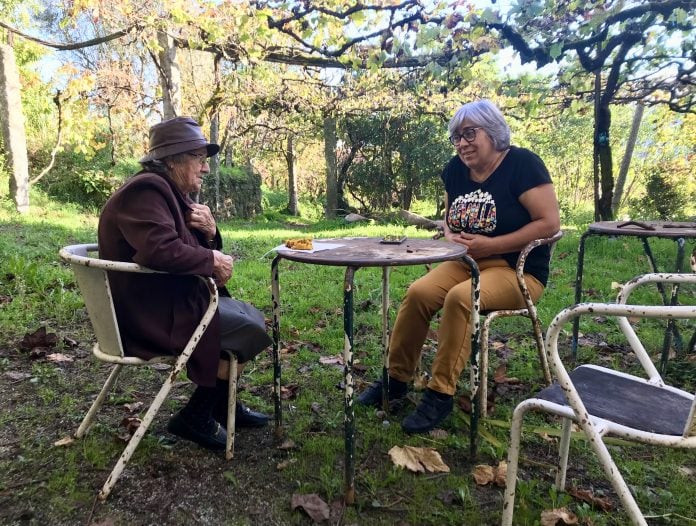The photograph you see in the illustration of this article is the image of two influential women in my life. My maternal grandmother and my mother. They were talking about their lives under the centennial vine branches of my grandparents’ house, right next to a gate that dates back to 1893.
It is a house inside a more than century-old wine farm. It was not founded by my family, but as history tells, it was a considerable achievement bought by my grandfather, back in a time when the Estado Novo dictatorship reigned in Portugal. A fascist government that would rule Portugal from 1933 to 1974, and that would put Portugal in a huge economic and cultural stagnation.
This purchase would also mark my family’s history, setting a narrative that tells the past from the side of those who had the money, while neglecting the unpaid labor effort of all my maternal family.
For some, this photograph has all the characteristics of a bucolic scene. It was also taken in Fall, at the time of falling leaves and changing temperatures. There seems, however, to be more to this image than this feeling.
Something more than two women talking, the smell of wine fermenting in the cellar, or brown leaves flying through the air. The image lacks the dialogue that lasted a good part of the afternoon.
A conversation full of Portuguese nostalgia, of past memories, wrapped up with the feeling of impotence before a fate already written in the stars, perhaps an ancient legacy of the Arabs in our lands.
First, my grandmother, tired in her eighties, sat down. And then my mother sat in front of her. What followed would shock, or not, the ears of other younger generations.
My grandmother started to complain about my grandfather’s lack of appetite. Fortunately, she said, there was everything in that house: chicken, rabbit, codfish, potatoes, beans, pasta, or rice.
But the problem was not the lack of options but that with each passing day, it became more and more challenging to cook for my grandfather, a man soon to turn eighty-nine years old.
The shock that I said I could feel, however, is not because of my grandfather’s lack of appetite but because of my grandmother’s eternal role as a housewife. A whole lifetime of having to be one without ever having been asked whether she wanted that role.
But it doesn’t shock her either. Perhaps we are all the result of our time, morals, and customs. For better or worse, we all play the role without having been asked whether it was the one we wanted.
My grandfather, contrasting immensely with her, doesn’t even know how to turn on the stove at home. Nor how to take the food out of the pot my grandmother puts on the table every day.
These tasks have always been relegated only to her. My grandmother was entrusted with the household chores and everything around it, i.e., the land and her agricultural work.
In my youth, it was commonplace to see my grandmother with a hoe in her hands, sometimes bent down with a sickle to cut the grass or behind the flock of sheep or goats scattered around the farm.
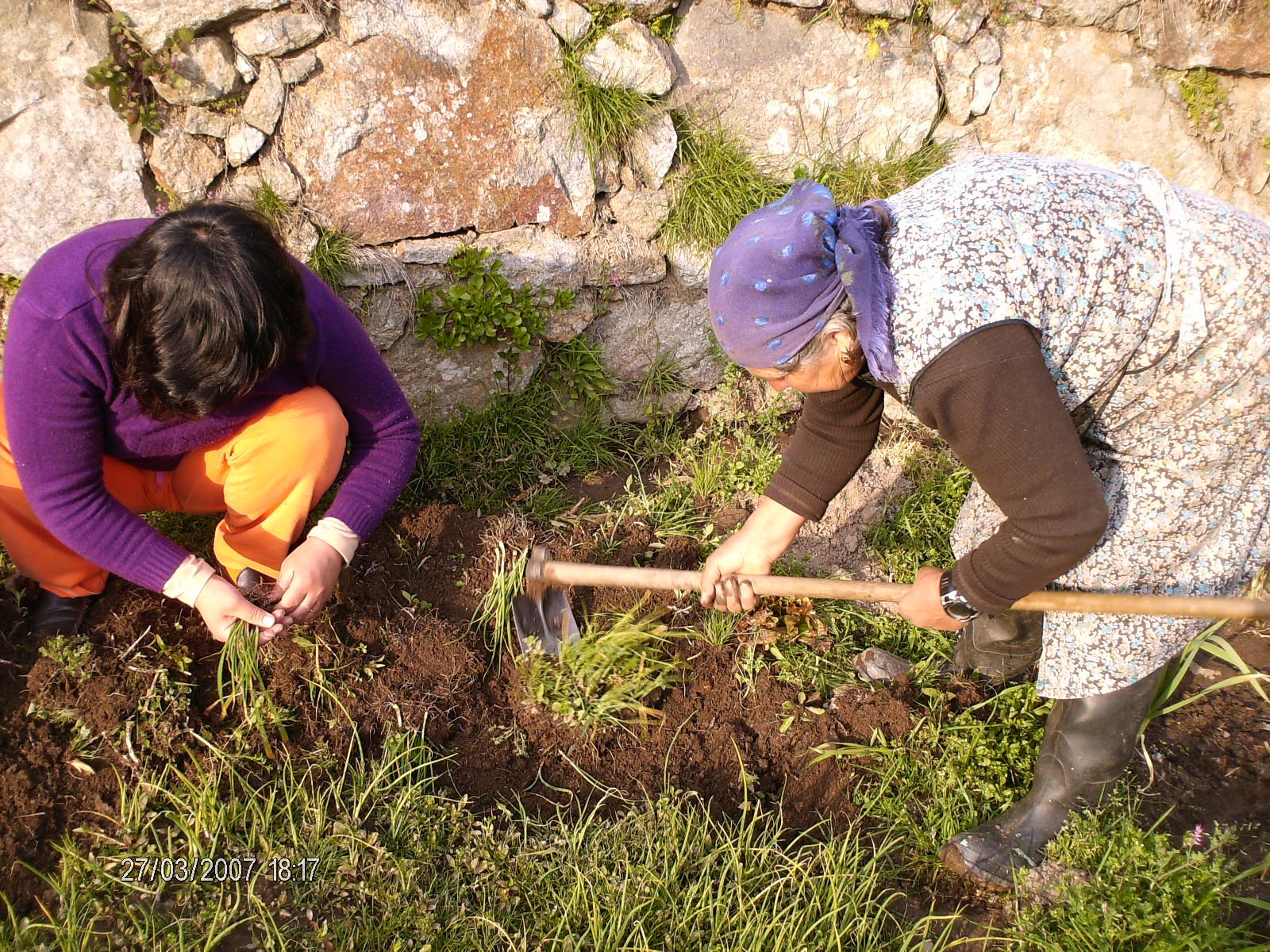
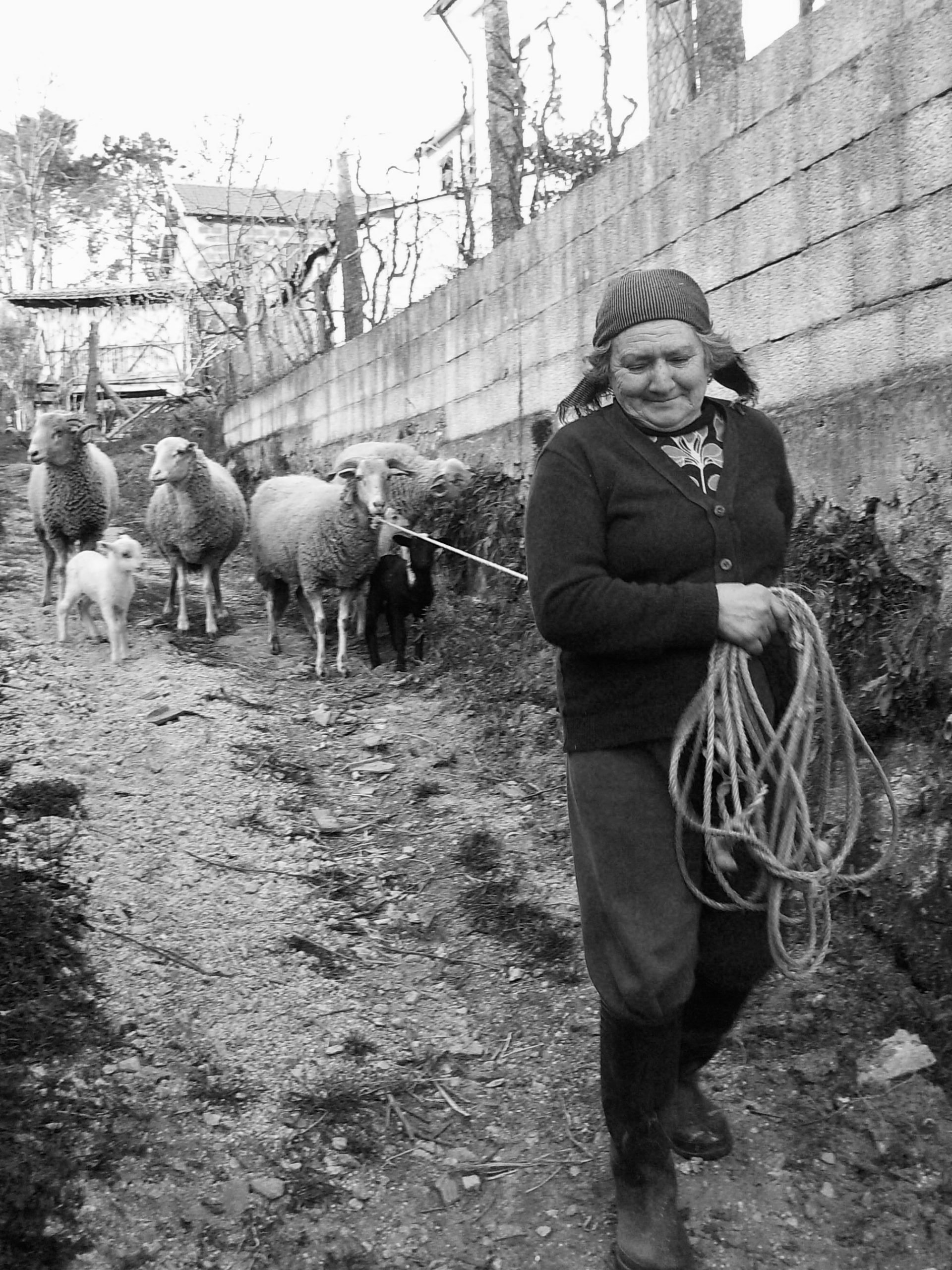
I saw her always bustling about, trying to balance between opening the water tank and watering the vast vegetable garden or running to the kitchen to prepare lunch.
I can almost hear the sound of the crunch of onions just pulled from the earth, mixed with the olive oil coming from the olives from the same farm, and the big red tomatoes, tasty and very fragrant, cut into pieces falling into the pot.
I can also sense the smell that began to waft through that kitchen, mixed with the sound of an RTP newscaster coming through the small television into that kitchen with us.
Except for the pasta or the rice, everything came from their farm. Meanwhile, my grandfather would always arrive, coming from the village with some groceries, accompanied by his grandchildren who had come home from school, and his sons who, even though were already married and grown up, would show up for lunch.
There were fried potatoes and eggs for the grandchildren, beans and meat for my grandfather, and pasta with chicken for everyone else. I don’t know how she could take care of a house like that, making two or three different dishes every lunch.
But what is certain is that everything was done. But it wasn’t magic; it was her work that was always taken for granted, as expected, as “it should be.”
These are all images of my grandmother entering her retirement age. However, for someone who supposedly and legally “never worked,” there was no moment in her life when effectively setting aside her day-to-day tasks became official.
Her work did exist, though. This must be said. Besides all her tasks as a housewife and farmer, let’s not forget the role of motherhood.
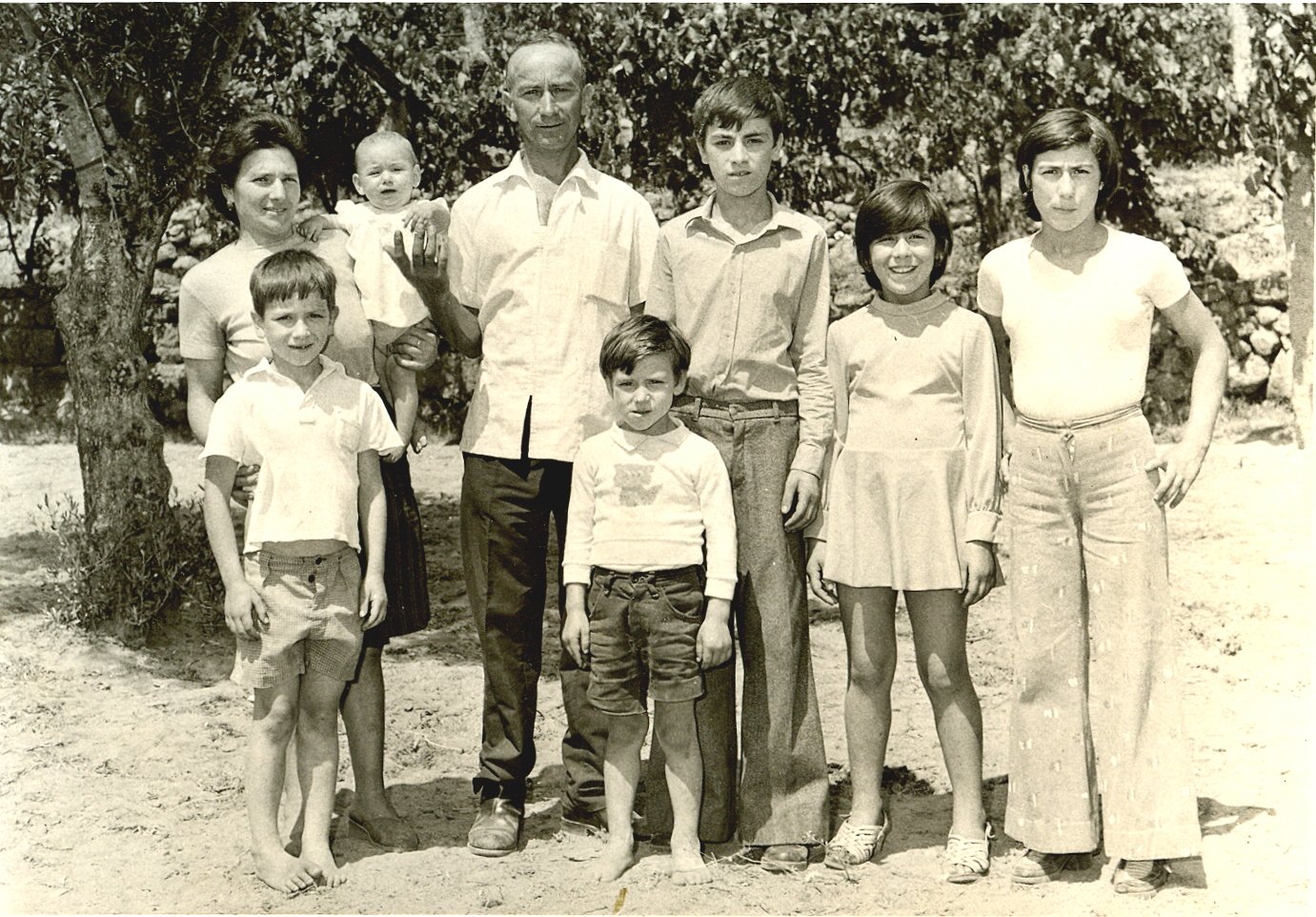
Taking care of their seven children was also part of her duties. The father was always responsible for the money that would come in. She was responsible for everything else: breastfeeding them, changing diapers, and teaching them how to live.
While the public social space was nonexistent for her, who had always lived on that farm, my grandfather was the supposed real breadwinner of that house. He was the only one with a paid job and the only craft valued within the family.
One could say that by leaving home, having a boss, and socializing with other people, my grandfather was also part of the history of my village, unlike my grandmother, the typical female figure we so often feel is without history.
And figures without history are without the power to tell it. It’s almost as if they don’t even exist in real life, and it’s as if they pass by or are indispensable. But so often, these exact figures are the pillar of our civilization.
I only need to think that my grandfather didn’t know how to cook or didn’t want to serve his own food. Something that makes me very perplexed is that he’s this way. What would he be without her? Or how would my uncles, aunts, and my mom have survived?
Sure, life wasn’t easy for either of them. Both my grandparents lived most of their youth under the fascist regime of Salazar in Portugal. They were both poor and, therefore, both suffering. Even more so, they lived in rural Portugal, much more forgotten, abandoned, and where illiteracy proliferated.
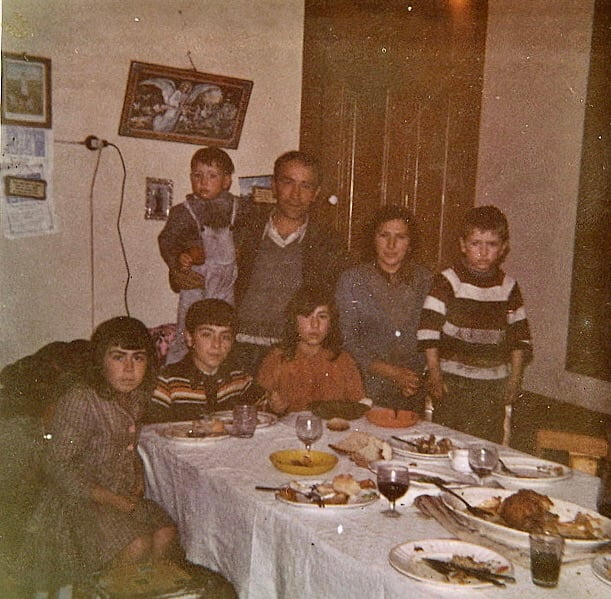
But if life was hard for poor men, it was even more complicated for women, who were relegated to second-class citizens under God’s motto of country and family.
There was a very infamous saying, sometimes even found at the entrance of houses in the typical blue tiles of Portuguese culture “She runs the house, but it’s me (the husband) who rules her.” Indeed this motto was found everywhere: the women took care of the family, but the men ruled the world.
Women’s rights were limited, if not nonexistent. And my grandmother is the personification of these ideals, which were also the Salazarist ideas, of which she doesn’t even know she was a part. She was the loving mother, the devoted wife, and the true fairy of the home. Without knowing it, she had been trained to perform this role.
Trained by her father, mother, and the winds of the times in which she lived. Her little schooling also made her accept it and never question things’ order. She never touched money, nor could she count it, because she was not allowed a paid job. That was only her husband’s right.
My grandmother didn’t aspire for more, but she didn’t know that even if she did, she wouldn’t be able to have it either. Like other women, she couldn’t be a merchant, leave the country alone, open a bank account, or take contraceptives without her husband’s permission.
From being dependent on a father, she would become dependent on a husband, never achieving adult status. Always keeping her in an inferior position and limiting her ambitions to advance the social hierarchy.
And even when the country needed women to work in factories, women did not achieve the same status as men, as they were paid half as much as men. Same work, different amount of pay. And if the written laws were not enough, then there were the laws of morality and the shame a man could feel if he knew his wife was earning as much as he was.
The “Estado Novo” (the name given to the Portuguese fascist regime) and the passivity of the general population agreeing with these norms made women submissive without knowing they were so.
Women lived in the shadows of men without any rights and in fear. In fear of domestic violence and under a Government that did not protect them. Fear even of their husbands, who, even if they murdered them, would not even go to jail.
They were second-class citizens.
My grandmother belonged to this category. She had been a farmer, a cleaner, an ironer, a laundress (how many times I saw her wash clothes in the cold winter putting her hands into the frozen water of the farm’s tank), and a cook, but she was not paid for it.
Many might say that she worked for herself and her family. But to say this is to devalue the value of her work. Nowadays, it is expensive to pay for t someone to clean our house. We pay dearly for someone to wash our clothes and iron them.
We pay for those who care for our children, and even more when we eat in good restaurants. All this was done by her and by others like her. We pay dearly for those who do this for us, but we devalue the work given to us as free— perhaps because of this.
And if this was the portrait of women in Portugal during fascism, it was not the sudden transition to democracy that changed the culture and way of looking at women overnight. Of course, it is undeniable how much the April 25, 1974 revolution benefited women.
More so in legal terms. Women began to be admitted to the judiciary, and divorce was finally possible, regardless of whether it was civil or Catholic. In 1978 the reform of Family Law came into force under the premise that everyone was equal.
This ended the man’s figure as head of the family and all others as his submissives. Little by little, equality at work regarding pay arrived through the laws of 1979 and 1983.
But if all this is innovative, if you ask my grandmother, my mother, or even my aunts who are younger, if they felt this change in their daily lives, the answer is probably no.
Making laws definitely helps to protect your citizens, but changing a culture takes years or a whole generation. My mother’s story might fit in here too. She got married very early, at seventeen. She had my brother at eighteen and me at twenty-four.
My father, a construction worker and a man who was also a victim of his times, never “allowed” my mother to enter working life. I put that in between commas because this was never said but always felt. We are already talking about the early nineties.
While in many other countries, such actions might be seen as absurd, I reiterate again that suddenly changing the culture of a people is no easy task. But, just like my grandmother, my mother always worked.
Taking care of the children, farming, cleaning the house, and being informally employed by my father in his construction company either as a secretary or someone who drove trucks with sand, cement, or bricks.
If my childhood memories of my grandmother were seeing her in front of sheep, my mother’s image is of a woman getting off the truck and unloading sand with other employees of my father or passing heavy bags of cement on her shoulders.
All this, of course, without being paid because all this had been seen as working for the family. At the beginning of the new millennium, and only years later, with the enormous financial crisis, my mother, almost in her forties, left home and got a job. A job which nonetheless is always meant for women since she is a cleaning lady in a factory.
But if the advent of democracy and all the passed laws benefited women, they found themselves at a tremendous crossroads. For if they were now admitted into the public space – something that, as I told you, my grandmother never achieved – and worked in jobs “like men,” their workload doubled.
All this because the domestic space and everything inherent to it continued (and continues for the most part) to be seen as assigned to women.
So, in addition to their work outside the house, they would arrive home only to continue working, neglecting their rest time, which is necessary for any human to be functional. And most of the time, in addition to their work being the same as men’s, wage differences persisted.
Men and women doing the same job were paid differently, with men often being paid twice as much as women. And as such, as women reached an advanced age and entered retirement, these differences became more pronounced.
Women always with lower pensions and men with higher allowances. Just look at the example of my grandmother. She worked as much or more than my grandfather, but she doesn’t have a pension because she was always in the informal market.
But when it comes to both of them going to the pharmacy and getting the same medicines, there is clearly no differentiation, which always makes women poorer. If democracy brought many rights to women, getting them out of poverty was not and is still not so easy.
Still, even in the new millennium, one finds reports like this of women earning less. And of women too, who have been swallowed up by the mentality of patriarchy and think it is customary to make less.
Women are, because of all this, exhausted. And I would also like to say that all this is just found in the past, or that I have never felt this discrimination happening. But I would be lying if I said so.
When I was employed, I always saw my male colleagues earning more without any plausible justification. The peak of my tolerance ended when I trained a male colleague, who was also younger than me, and he then joined the same company earning one hundred euros more than me.
I quit my job, angry at my country, where wage discrimination is forbidden by law but where it is still so easy to get around it all.
The conversation on my grandparents’ farm continued that afternoon between those three women, the two in the photograph and the one behind the camera. These three generations crossed paths that continue to witness similar problems like the lack of a voice in the public space.
It is crucial to hear conversations like this and just as important, if not more, to not give up or take anything for granted. And in the days we are all living in, with the winds of fascism blowing into the world, Portugal being no exception, we must continue the fight for equality.
As Simone de Beauvoir said to Claudine Monteil, a feminist of the women’s liberation movement, “Never take anything for granted. All it takes is a political, economic, or religious crisis for women’s rights to be questioned. All your life, you must remain vigilant! ( Monteil, Claudine 2009, Simone de Bauvoir; Modernité et engagemnet, Paris: L’Harmattan)

